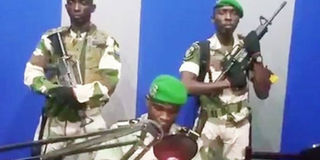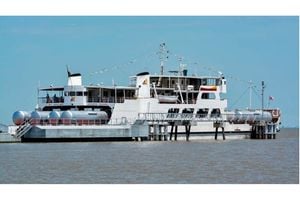Prime
Three soldiers behind Gabon's failed 2019 coup jailed for 15 years

A coup attempt failed in Gabon in 2019. PHOTO/FILE
What you need to know:
- President Ali Bongo Ondimba was in Morocco at the time, recovering from a stroke that he suffered in October 2018 while in Saudi Arabia.
Three soldiers behind a failed coup in Gabon in 2019 have been sentenced to 15 years' prison, the prosecutor told AFP on Thursday.
The three, including Lieutenant Kelly Ondo Obiang who was a member of the elite Republican Guard, had gone on state television on January 7, 2019, calling for a "public uprising" during the short-lived coup.
Six co-defendants -- five policemen and a civilian -- were acquitted, the prosecutor said.
The trial by a special military court in Libreville, which began on June 18, ended with the verdict overnight, he said.
The sentence is considered relatively lenient, as the defendants had faced a charge of undermining state security, which carries a potential life term.
"My clients are happy, they made a victory sign to those present," one of their lawyers, Jean-Pierre Moumbembe, told AFP, adding that he had appealed the verdict.
The soldiers were also handed fines totalling 31 million CFA francs ($56,000 / 47,000 euros).
Shockwave
The episode jolted the oil-rich state, which has been run by an elected father-and-son dynasty since 1967.
President Ali Bongo Ondimba was in Morocco at the time, recovering from a stroke that he suffered in October 2018 while in Saudi Arabia.
Wearing camouflage and brandishing guns, the renegades forced their way into the headquarters of the state broadcaster Radio-Television Gabonaise (RTG), where they called for an uprising to "save the country from chaos".
But the call gained no traction, and the attempted putsch was rapidly crushed.
Two of the group were shot dead by the security forces, and Ondo Obiang, the ringleader, was arrested with the other soldiers.
Bongo, 62, was elected in 2009 after the death of his father, Omar Bongo, who was head of state for 42 years.
Bongo was re-elected in 2016 in a ballot that the opposition strongly criticised.
According to the defence lawyers, the defendants wanted to prevent the president's brother, Colonel Frederic Bongo, from taking power by force.
They had been particularly concerned about the presence of "mercenaries" in the country.
At the time, Colonel Bongo was head of Gabon's most powerful intelligence service.
Nine months after the would-be coup, he was removed from the inner circle of power and appointed military attache at Gabon's embassy in South Africa.
The judge overseeing the military court refused a request to have Colonel Bongo testify.
"My client's motive was to prevent an attempted coup -- we are not contesting the offence but giving the rationale behind it," one of the defence attorneys, Anges Kevin Nzigo, told AFP.
The botched coup occurred at a time of frenzied speculation in Gabon following Bongo's stroke.
Rumours proliferated that the president was incapacitated or dead, and that his chief of staff, French-Gabonese national Brice Laccruche Alihanga, was exploiting the situation in order to seize power.
When Bongo returned to the political scene, Laccruche, who had also been promoted to minister, was gradually pushed out.
In December 2019 he was arrested along with several other ministers and reputed cronies in a huge anti-corruption drive, Operation Scorpion.
He is in prison, facing charges of corruption and embezzlement of public funds. His trial opened in late April.





